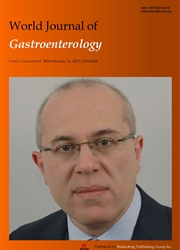

 中文摘要:
中文摘要:
瞄准:为了估计在人的白血球抗原(HLA ) 之间的严密关系,搀肝炎 B 的等位基因和结果借助于元分析的病毒(HBV ) 感染。方法:Medline/PubMed, EMBASE, CNKI 和贵宾被寻找识别相关研究。学习质量用纽卡斯尔渥太华规模被评估。机会比率(或) 并且 95% 信心间隔(95% CI ) 用 Stata 11.0 被分享。亚群分析被种族执行。异质和出版偏爱分析被执行验证可靠。结果:有自发地从优先的 HBV 感染恢复的长期的肝炎 B 和 2606 控制的 2609 个病人的一个总数被包括。元分析显示出那 HLA 医生 *04 (或 = 0.72, 95% CI:0.60-0.85 ) 并且医生 *13 (或 = 0.27, 95% CI:0.19-0.37 ) 当病人带时,等位基因显著地与 HBV 清理被联系 HLA 医生 *03 (或 = 1.47, 95% CI:1.16-1.87 ) 或医生 *07 (或 = 1.59, 95% CI:1.24-2.03 ) 等位基因有长期的 HBV 的显著地增加的风险坚持。为 HLA 医生 *01 多型性,一显著地,有 HBV 清理的协会在中国汉组被发现(或 = 0.48, 95% CI:0.26-0.86 ) ,然而并非在另外的种族组发现(P = 0.191 ) 。为另外的多型性,有 HBV 感染结果的协会都没被发现。结论:HLA 医生 *04 和医生 *13 等位基因可以是为 HBV 清理和 HLA 医生 *03 的保护的因素,并且医生 *07 等位基因可以是为 HBV 坚持的风险因素。
 英文摘要:
英文摘要:
AIM:To assess the rigorous relationship between human leukocyte antigens(HLA)-DR alleles and outcomes of hepatitis B virus(HBV) infections by means of metaanalysis.METHODS:Medline/PubMed,EMBASE,CNKI and VIP were searched to identify relevant studies.Study quality was evaluated using the Newcastle-Ottawa Scale.Odds ratios(OR) and 95% confidence interval(95% CI) were pooled using Stata 11.0.Subgroup analyses were performed by ethnicity.Heterogeneity and publication bias analyses were performed to validate the credibility.RESULTS:A total of 2609 patients with chronic hepatitis B and 2606 controls spontaneously recovering from prior HBV infection were included.Meta-analysis showed that HLA-DR*04(OR = 0.72,95% CI:0.60-0.85) and DR*13(OR = 0.27,95% CI:0.19-0.37) alleles were significantly associated with HBV clearance while patients carrying HLA-DR*03(OR = 1.47,95% CI:1.16-1.87) or DR*07(OR = 1.59,95% CI:1.24-2.03) alleles had a significantly increased risk of chronic HBV persistence.For the HLA-DR*01 polymorphism,a significantly association with HBV clearance was found in Chinese Han group(OR = 0.48,95% CI:0.26-0.86),but not found in other ethnic groups(P = 0.191).For other polymorphisms,no association with the HBV infection outcome was found.CONCLUSION:HLA-DR*04 and DR*13 alleles may be the protective factors for HBV clearance and HLADR*03,and DR*07 alleles may be the risk factors for HBV persistence.
 同期刊论文项目
同期刊论文项目
 同项目期刊论文
同项目期刊论文
 期刊信息
期刊信息
